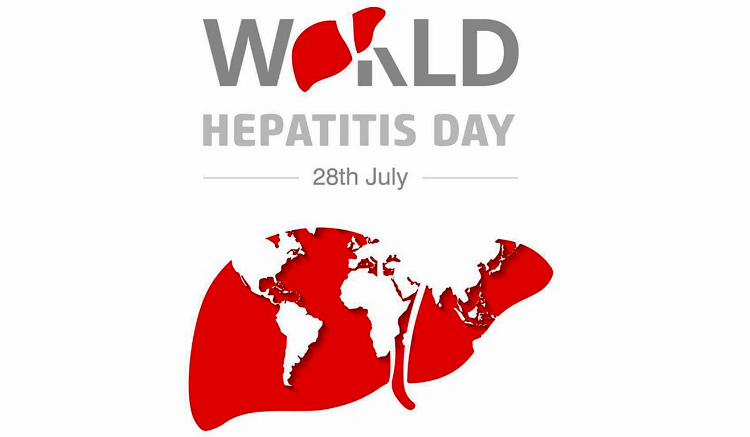Important Facts For Prelims
World Hepatitis Day
- 29 Jul 2023
- 6 min read
Why in News?
World Hepatitis Day (WHD) takes place every year on 28th July bringing the world together under a single theme to raise awareness of the global burden of viral hepatitis and to influence real change.
What are the Key Points Related to WHD?
- Theme 2023: One life, one liver.
- Significance:
- On this day, communities, people, and politicians may learn about the many varieties of hepatitis, as well as about preventative strategies, testing, and treatment choices.
- It promotes global advocacy and cooperation in the fight against the rising number of hepatitis-related diseases and fatalities.
What is Hepatitis?
- About:
- The word hepatitis refers to any inflammation of the liver — the irritation or swelling of the liver cells from any cause.
- It can be acute (inflammation of the liver that presents with sickness — jaundice, fever, vomiting) or chronic (inflammation of the liver that lasts more than six months, but essentially showing no symptoms).
- Causes:
- Usually caused by a group of viruses known as the “hepatotropic” (liver directed) viruses, including A, B, C, D and E.
- Other viruses may also cause it, such as the varicella virus that causes chicken pox.
- SARS-CoV-2, the virus causing Covid-19 may injure the liver too.
- Other causes include drugs and alcohol abuse, fat buildup in the liver (fatty liver hepatitis) or an autoimmune process in which a person’s body makes antibodies that attack the liver (autoimmune hepatitis).
- Types of Hepatitis:
- Hepatitis A virus (HAV): It is an inflammation of the liver that can cause mild to severe illness.
- It is transmitted through ingestion of contaminated food and water or through direct contact with an infectious person (sex practices).
- Almost everyone recovers fully from hepatitis A with a lifelong immunity (few people with HAV could die from fulminant hepatitis).
- A safe and effective vaccine is available to prevent hepatitis A.
- Hepatitis B virus (HBV): It is a viral infection that attacks the liver and can cause both acute and chronic disease.
- It is most commonly transmitted from mother to child during birth, in early childhood, during sex with an infected partner, unsafe injections.
- Hepatitis B can be prevented by vaccines.
- Hepatitis C virus (HCV): The virus can cause both acute and chronic hepatitis, ranging in severity from a mild illness to a serious, lifelong illness including liver cirrhosis and cancer.
- It is a bloodborne virus and most infection occurs through exposure to unsafe health care, blood transfusions, injection drug use and sexual practices.
- Direct-acting antiviral medicines (DAAs) can cure more than 95% of persons with hepatitis C infection, but access to diagnosis and treatment is low.
- There is currently no effective vaccine against hepatitis C.
- Hepatitis D virus (HDV): It is a virus that requires hepatitis B virus (HBV) for its replication. It affects globally nearly 5% of people who have a chronic infection with HBV.
- Hepatitis B and D can infect people together (co-infection) or one after the other (super-infection). This is more common in native people, dialysis patients and drug users. Having both viruses is very bad for the liver and can cause cancer or death.
- Hepatitis D infection can be prevented by hepatitis B immunization, but treatment success rates are low.
- Hepatitis E virus (HEV): It is an inflammation of the liver caused by infection with the HEV. It is found worldwide, but most common in East and South Asia.
- The virus is transmitted via the fecal-oral route, principally via contaminated water.
- A vaccine to prevent hepatitis E virus infection has been developed and is licensed in China but is not yet available elsewhere.
- Hepatitis A virus (HAV): It is an inflammation of the liver that can cause mild to severe illness.
What are the Government Initiatives to Tackle Hepatitis?
- National Viral Hepatitis Control Program:
- The Program aims to end viral hepatitis as a public health threat by 2030 in the country.
- India's Universal Immunization Programme (UIP):
- Hepatitis B is included under India's UIP which provides free of cost vaccination against eleven vaccine-preventable diseases i.e., Tuberculosis, Diphtheria, Pertussis, Tetanus, Polio, Pneumonia and Meningitis due to Haemophilus Influenzae type b (Hib), Measles, Rubella, Japanese Encephalitis (JE) and Rotavirus diarrhoea.







